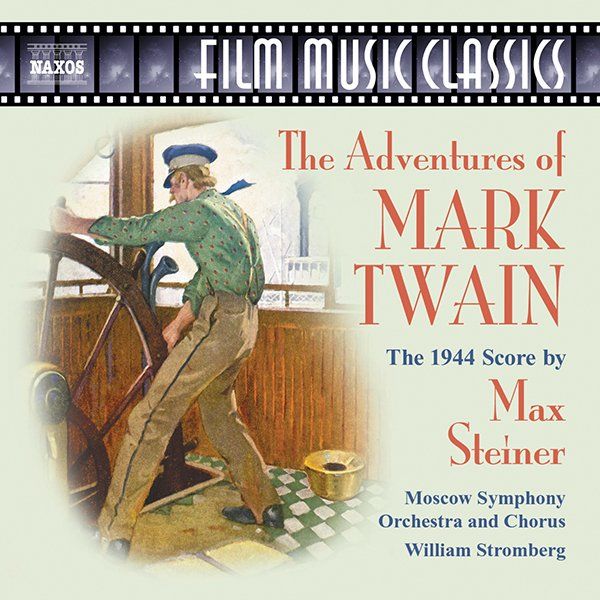Rerecording Max Steiner

Originally published in the Journal of Film Music Vol. 1 No. 4, 2009
With permission of the author Brian C. Thompson and editor William H. Rosar
In this age of shrinking record catalogs, new recordings of old film music are rare and sometimes precious things. Quality sound recordings are especially valuable for teaching film music, but the market appears to be far too small for most record companies to invest in. In this climate the current discography of even a composer of Max Steiner’s stature is scant. Despite his prolificacy, his acknowledged importance, and the enduring popularity of many of the films he worked on, few recordings of Steiner’s film scores have been released on CD. Aside from various collections of “highlights,” there have only been recordings of the music from the most famous films: primarily, GONE WITH THE WIND, CASABLANCA and KING KONG, but even these are now mostly out of print. For this reason, the efforts of the Naxos and Marco Polo record labels should be more widely known.
Over the past decade the Marco Polo label has become known for an adventurous catalog that includes a substantial number of classic film scores. The music of Max Steiner, Georges Auric, Arthur Honegger, Bernard Herrmann, Franz Waxman and many other leading film composers of the 20th century have been re-constructed, recorded, and packaged with great care. The availability of this series reflects the desire of the label’s management to develop a catalog of important but often neglected 20th-century music, and the commitment of the musicians behind most of these productions: the Swiss conductor Adriano and the team of composer John Morgan and conductor William Stromberg. Most of their recordings have been made either by the Moscow Symphony Orchestra at Mosfilm Studio or by the Slovak Radio Orchestra in Bratislava. While recording in eastern Europe has helped to keep costs down, overall, the performances have been outstanding and the savings have been diverted into quality booklets. The Steiner scores produced thus far on Marco Polo are single discs of KING KONG (8.223763), THEY DIED WITH THEIR BOOTS ON (8.225079), and THE TREASURE OF THE SIERRA MADRE (8.225149); combinations of ALL THIS, AND HEAVEN TOO / A STOLEN LIFE (8.225218), THE LOST PATROL / VIRGINIA CITY (8.223870), and SON OF KONG / THE MOST DANGEROUS GAME (8.225166); and a collection that includes selections from Steiner’s scores for THE THREE MUSKETEERS (8.223607) and THE CHARGE OF THE LIGHT BRIGADE (8.223608).
Earlier this year film music titles began to appear on Marco Polo’s sister label, Naxos, in a new Film Music Classics series. Like the Marco Polo discs, they are attractively packaged, but as Naxos releases they are sold for just $6.98 – a remarkable price for some of the finest film music ever composed. Already issued on Naxos are Auric’s LA BELLE ET LA BÊTE (8.557707); the Herrmann/ Newman score for THE EGYPTIAN (8.557702); Honegger’s LES MISERABLES (8.557486); Waxman’s OBJECTIVE, BURMA! (8.557706); Tiomkin’s RED RIVER (8.557699); collections of scores by Adolph Deutsch (8.557701) and the Polish composer Wojciech Kilar (8.557703); a collection of horror film music by Hans J. Salter and Frank Skinner titled MONSTER MUSIC (8.557705); and three Steiner titles. One of these is a recording of Steiner’s music for THE THREE MUSKETEERS appropriately packaged with Korngold’s music for CAPTAIN BLOOD and Young’s music for SCARAMOUCHE (8.557704). Steiner’s score for THE THREE MUSKETEERS dates from 1935, the same year he won his first Academy Award (for THE INFORMER). One of the few really successful things about the RKO adaptation of Dumas’s Musketeers was the music. For this 1994 recording, John Morgan reconstructed nearly twenty minutes of Steiner’s score, providing six cues and some of the finest music ever to accompany a sword fight. This fine recording was made in 1994 by the Brandenburg Philharmonic, an ensemble created in 1992 for the performance of early film scores. The other Steiner discs issued by Naxos are KING KONG (8.557700) and THE ADVENTURES OF MARK TWAIN (8.557470).
The KING KONG disc originally appeared on Marco Polo in 1997. For it, Morgan re-orchestrated the entire score – over seventy-two minutes of music in this recording. His knowledge of this score is extensive and dates back to the 1976 recording made by Fred Steiner, for which Morgan assisted in selecting tracks and writing the liner notes. In the liner notes for the Marco Polo recording Morgan discusses how he reconstructed the score from “the complete mixed soundtrack of the original film, acetates of some of the music, and a few recently-discovered optical music stems containing several additional cues. Secondly, the surviving full scores, and thirdly (and most important), Steiner’s original annotated sketches, which contain every note he composed for this film.” (p. 20) The original job of orchestrating Steiner’s music had fallen to Bernhard Kaun, who worked wonders with the limits of the RKO studio orchestra. Morgan’s re-orchestration is perhaps closer to what Steiner had indicated in his sketches. The end result is not exactly what is heard on the sound track of the film but a highly effective digital recording. The Moscow Symphony Orchestra’s performance is outstanding, capturing both the excitement and poignancy of this groundbreaking score.
By comparison, the music for THE ADVENTURES OF MARK TWAIN might seem an unexpected choice for commercial release. Although this work earned Max Steiner an Academy Award nomination for best score (losing to his own score for SINCE YOU WENT AWAY), the Warner Bros. film is not well known. Produced in 1942, it was released two years later and soon drifted into obscurity. A 1988 release on VHS is now out of print and the film has yet to be released on DVD. Director Irving Rapper - who would complete another biopic RHAPSODY IN BLUE in 1945 - was initially reluctant to take on this film. He consented when actor Frederic March was selected for the title role. March had been a film actor since 1929 and in 1932 had won the first of two Best Actor Oscars for DR. JEKYLL AND MR. HYDE (the second would come in 1946 for his performance as the returning WWII veteran in THE BEST YEARS OF OUR LIVES). In THE ADVENTURES OF MARK TWAIN, the 47-year-old March gives a fine performance as Clemens, playing him from his early twenties to the end of his life, and is especially successful as the elderly writer. Warner Bros. put some effort into presenting an accurate portrayal of Twain, but historical facts were not the highest priority. This is essentially a war-time, feel-good film, presenting the grand sweep of the life of an American icon.
For THE ADVENTURES OF MARK TWAIN, Steiner produced a score of nearly 100 minutes, opening with an overture. The orchestration, again by Bernhard Kaun, was full and included a number of non-orchestral instruments as well as chorus for the finale. As with LITTLE WOMEN, GONE WITH THE WIND, and others, the film’s historical setting afforded opportunities for setting the scene through quotation. The earlier segments of THE ADVENTURES OF MARK TWAIN offered some of the best opportunities for colorful scoring. Steiner responds by invigorating his late romantic idiom with splashes of period song. In “Gold Rush” he hints at the folk ballad “Oh, My Darling Clementine” before quoting the chorus in full. Quotations from “Oh, Susanna,” “The Battle Hymn of the Republic,” and “Dixie” evoke 19th-century America in the film’s Civil War-era segments. In each of these examples and elsewhere, the vernacular emerges naturally from the rich orchestral textures. In later parts of the film, Hawaiian guitar, pentatonic scales, and quotations from Arne’s “Rule Britannia” accompany Clemens’s world travels. Twain’s theme itself is first heard in the open credits and subsequently appears in various settings. Not surprisingly, given Steiner’s abilities, this theme, jaunty one moment and sentimental the next, is perfectly analogous to the film’s depiction of the title character.
If the music of MARK TWAIN is more about color than depth, one can hardly fault the composer, and there is much to admire in Steiner’s score. To create a reconstruction that can fit on one CD Morgan has omitted the overture, which mostly comprises themes heard elsewhere in the score, and made other cuts. Otherwise, the changes are slight. One example is the touching “Sorrow,” an episode in which Clemens sings to his dying wife, where Morgan effectively uses an oboe to play the melody of “Swing Low, sweet Chariot.” This is Morgan and Stromberg’s second recording of the MARK TWAIN score. They recorded 38 minutes of this music with the Brandenburg Philharmonic in 1993 (RCA Victor Red Seal 09026 62660 2). In the liner notes Morgan writes that he proposed re-recording the score as a memorial to the victims of the 9/11 terrorist attacks. “Although the film and score are virtually unknown today,” he writes, “the music ranks among Steiner’s finest, capturing the American spirit in a way that transcends the period of its composition.” (p. 6) Here we have a full 70 minutes, wonderfully played by the Moscow Symphony Orchestra, and finely recorded by engineer Genadiy Papin at Mosfilm Studios in February 2003. Those willing to shell out a bit more may opt for the DTS surround sound version. Both versions contain engaging liner notes by Bill Whitaker and arranger’s notes by Morgan, in English and German.
External link:
Film Music Classics






